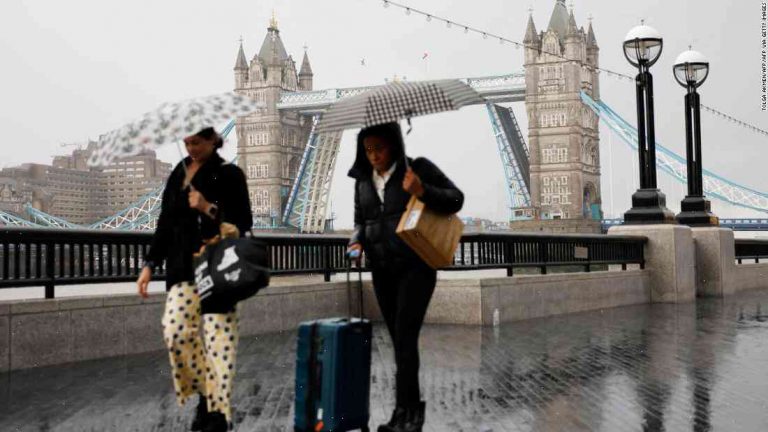BBC Breaking News
BBC News’ Peter Biles met a little girl who was made a princess of the sea
One in six people in the UK won’t go to seaside resorts this summer.
That is a record drop and is particularly worrying given that visits from across Europe are up.
It is the latest sign that Brexit is disrupting the UK’s place on the world tourist map.
According to the UK Office for National Statistics (ONS), non-domestic tourism dropped 5% in the first three months of the year.
That compares with the previous quarter, which was boosted by a 24% increase in domestic tourism as the nation followed the football World Cup.
That spike was an anomaly, but our analysis shows that domestic travel fell for the first time in ten years in the first quarter.
Was Brexit to blame?
Hotels, restaurants and flights were hit hard last year by the sharp fall in the value of the pound following the Brexit vote.
The pound’s slump meant the likes of tourists from the US and Russia had to spend more to afford a stay in hotels and eat out.
This meant they were less likely to visit popular sites, including London, the east coast of England and coastal resorts such as Cornwall.
According to a survey by Barclaycard, almost three-quarters of people who did travel said they were worried about it.
But the predicted downturn did not arrive, with Britons still visiting many of the UK’s tourism favourites.
According to Visit Britain, Brits went on three million more holidays abroad last year than in 2015, continuing a long-term upturn.
In London, visitor numbers in June were up 7%, while the number of UK visitors to Europe went up by almost 4%.
And Britons still paid much less in tourist taxes than many other visitors.
The prices of hotel beds and flights stayed virtually stable in the first three months of the year, despite an 8% fall in the exchange rate.
It means that British travellers still shelled out less than their European counterparts to rent their holiday home, buy a ticket to a theme park, pay for theme park extras, visit a museum or visit a theatre.
Why it matters
Despite the downturn in UK tourism, for many of those British holidaymakers the choice is still very much international.
English has long been the language of choice when you visited the UK in the past and that still holds true today.
Last year, a poll found that four out of five British holidaymakers would use English when they visited the country, despite the UK’s language difficulties.
But in recent years, many companies have taken note and spent hundreds of millions of pounds on making sure their websites are powered by English.
Travellers from other European countries also choose English-speaking travel agents.
That could well change if the collapse of Debenhams, the largest UK department store, this week, is any guide.
In terms of businesses dependent on foreign visitors, Michelin starred restaurants in London have been under pressure from the weakening pound since the referendum, while many other companies, such as luxury retailer Mulberry, have been hit by the currency fluctuations.
Businesses such as restaurant chain Wagamama are also suffering.
Perhaps the biggest surprise is how little household spending in Britain is affected by the drop in spending abroad.
PoundShop, the majority-owned subsidiary of supermarket chain Sainsbury’s, had a strong year after the referendum, helping to keep sales up and profits up.
Analysis by Getty
